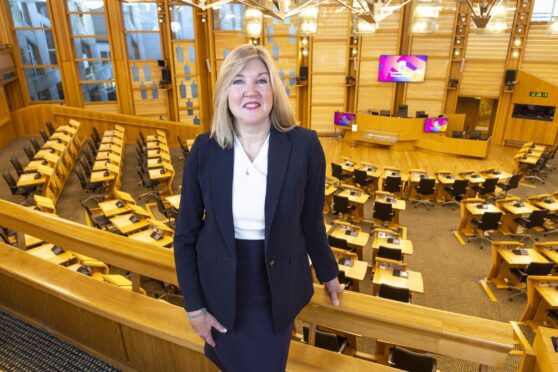
Bloviating politicians may have their fans. Somewhere. Sadly for the long-winded MSPs of Holyrood, the Presiding Officer Alison Johnstone is not one of them.
The transcripts of Scottish Parliament proceedings reveal she has asked for “short and succinct” questions and answers from MSPs in debates no less than 73 times since being elected to the role in May last year.
But Johnstone, the second woman and the first Green politician to fill the role, insists she is only trying to give as many parliamentarians as possible a chance to have their voices heard.
She said: “I’ve made no secret of my desire that we have both short and succinct questions and responses to match. We don’t have a parliament that sits into the small hours of the morning and so on. Part of that is about making democracy as representative as possible.
“If we want to have a parliament where everyone can consider becoming a member, then this has to be somewhere that makes it possible to combine work and life, where you may have caring responsibilities for elderly parents or young children.”
Earlier this month, her suspension of Holyrood’s budget announcement to investigate a leak of planned tax rises to BBC Scotland showed again her willingness to stand strong against ministers and MSPs.
Indeed, the first minister is among those told to wrap it up after twice being urged to “be brief” during an answer about NHS waiting times this month.
Johnstone said: “First Minister’s Questions is 45 minutes in the week where you are focused on many aspects of parliamentary business and I am very keen we hear from as diverse a range of voices across the chamber as possible.
“I appreciate that members are very passionate about the subject they are debating. But it’s also really important that I do everything I can to enable as many members as possible to take part.”
Johnstone said reform of FMQs is under consideration. “I’ll be having discussions with parties to see how we can best make sure that more questions are taken,” she said.
A former champion athlete, Johnstone has been at the Scottish Parliament since it opened in 1999, first as a parliamentary assistant to Robin Harper – the first elected Green parliamentarian in the UK – and then as an MSP since 2011.
Anas Sarwar on why winning seats is the next phase of his masterplan for Scottish Labour
That year the Scottish Greens won two seats, with Johnstone the party’s co-convener between 2019 and 2021. At last year’s Holyrood election, the party won eight seats and formed a coalition with the SNP at Holyrood, with the party’s current co-leaders Patrick Harvie and Lorna Slater appointed ministers.
But Johnstone said she had no regrets about taking up the politically neutral role of Presiding Officer at a time when the Greens have made such gains.
She said: “I thought very carefully about whether to put myself forward. It was a difficult decision, having been involved in party politics since the 1990s.
“But this role has been a great honour and a huge privilege. It is endlessly interesting, very challenging and I’m committed to do my very best.”
Controversies at Holyrood this year have included a woman being ejected from an equalities committee meeting for refusing to remove a scarf in suffragette colours. The committee was discussing reforms to Scotland’s gender recognition laws, and Johnstone later apologised, saying the woman’s removal was an error.
The issue aroused more heat when the public gallery was temporarily cleared last Tuesday during the marathon, impassioned debate on the proposed legislation. Johnstone said how the public can best engage with Holyrood is being looked at: “Parliament has undertaken to review its visitor code of conduct. It’s important that it’s clear both to visitors and staff.
“I want every opportunity possible for people to come in and see their representatives at work. It’s really important that our doors are wide open.”
Johnstone said one of the highlights of the past year has been MSPs being able to return without Covid restrictions.
Scotland still faced lockdown measures when she was elected Presiding Officer in May 2021, and the spread of the Omicron variant last winter saw MSPs move to remote working for most of their week.
“My introduction in this role was to a hybrid parliament, so a great highlight was getting everyone back into the chamber. It’s certainly a lot livelier now,” Johnstone said, wryly.
“Many new members didn’t have the opportunities to get to know one another normally expected after the election. Relationships are key to this role and to the effective working with the parliament, so I’m very pleased that we’re beyond that.”
Johnstone said it was important Holyrood keeps evolving and next month it will pilot a proxy voting for MSPs unable to vote due to illness, bereavement or parental leave.
She said: “Life has changed since the pandemic and we’ve lost members who have cited, at least to some extent, the difficulties of balancing life as a parliamentarian with family commitments.
“This is not just an issue in parliament. It is across many organisations and institutions but parliament does have a role to play as a role model.”

Enjoy the convenience of having The Sunday Post delivered as a digital ePaper straight to your smartphone, tablet or computer.
Subscribe for only £5.49 a month and enjoy all the benefits of the printed paper as a digital replica.
Subscribe